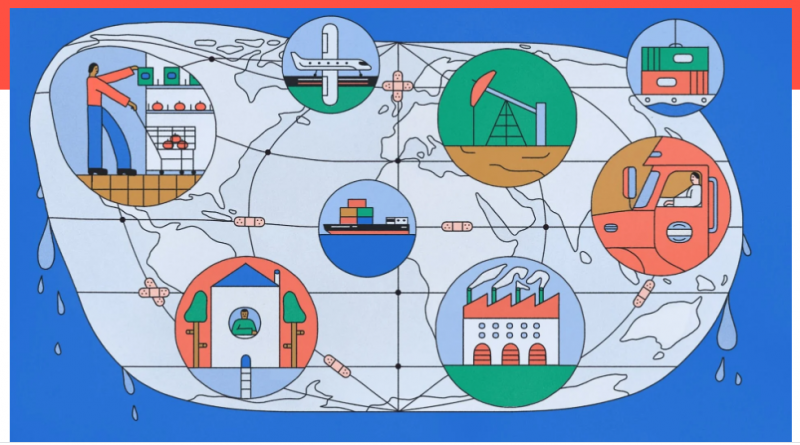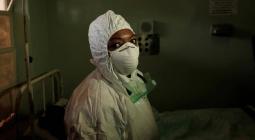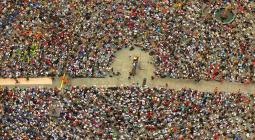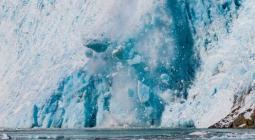Coronavirus and climate change: The pandemic is a fire drill for our planet's future.

Climate change will mean one emergency after another, year after year, as heat waves, floods, fire and storms blow cascades of failures through our systems.
We've been living in a dream. We climb into jet planes and fly across continents, never giving the accomplishment a second thought. We drive to grocery stores, assuming the shelves will be stocked with endless boxes of food. And every day we plug our devices into the wall, sure that electricity will flow from the outlet. Other than the occasional hurricane or earthquake, we have lived our whole lives taking for granted that this thing we call "civilization" was a machine that could never fail.
It's time to wake up.
The international COVID-19 pandemic is many things, but its deepest impact may be fostering a recognition that this machine of civilization that we built is a whole lot more fragile than we thought. And that is why, in the long term, the coronavirus will one day be seen as a fire drill for climate change.
To understand the powerful connection between this pandemic and climate change, we must understand exactly what "modern civilization" means from a scientific point of view. For researchers, the global high-tech society we've built over the last 100 years is actually a series of networks laid on top of one another.
Thanks to Facebook, we're all familiar with what "social networks" look like: the links we have to our friends and then their friends and then their friends expanding outward to make a vast spider's web of connections. Modern civilization is a delicate layer cake of such networks, one stacked on top of each other.
The transportation network — roads, trains, ships and airplanes — moves our goods around. Energy networks — electric grids, oil and natural gas pipelines — deliver power where and when it's needed. Economic networks — banks, investment firms and brokers — keep money for trade circulating. And, as we are coming to see in stark relief, there's the health care network — doctors, nurses and hospitals — that manages the endless stream of sickness and injury.
So how robust or resilient are these networks? If you kick them hard, will they still function? COVID-19 is exposing just how complacent we've been in answering that question. Health officials across the country are watching in horror and desperation as their network gets overwhelmed. The fear the pandemic has caused is already pushing on the food distribution and economic networks.
Suddenly all of these systems that were invisible just a month ago are standing in front of us in sharp relief. Some are even blinking red with warning. The warnings must be taken seriously, as studies of multilayered networks show they can be fragile: Breaking links in one network cascades through the others like a fragmenting bullet ripping through a complex machine.
So what does any of this have to do with climate change? Like this pandemic, climate change is also going to push on the networks that make up our civilization. Unlike the pandemic, its effects will be long term, and there won't be a vaccine that can save us.
When most of us think about climate change, we visualize changes to the planet: soaring temperatures, rising oceans, melting ice caps. That's hard enough to imagine on a global scale. But where our imaginations really fail is in asking what will happen to us, to daily human life, and that is a question about the invisible civilization networks. Climate change will mean one emergency after another, year after year, as heat waves, floods, fire and storms blow cascades of failures through our systems.
If I asked you just a few weeks ago to imagine what that would look like, what it would feel like, to see those networks stressed, you'd probably point to some Hollywood science fiction movie. Today, you just have to turn on the news. Now we know firsthand the dread that follows when these systems are threatened.
For all its uncertainty, the pandemic comes as no surprise to those who study infectious diseases. For years, they used their science to map out the effect of a novel virus' appearance. For years, they warned us that we needed to be prepared. The magnitude of that warning was not heeded, and now we are all paying the price.
As with the threat of a pandemic, scientists who study climate change have been warning for decades that we are unprepared for what lies just over the horizon. Using the same kinds of mathematical tools deployed by epidemiologists, they have predicted the course of global warming, laid out its potential effects on the networks that make up civilization and told us what needs to be done to avoid calamity.
Examples of threats these scientists worry about range from the disruption of global supply chains due to increasingly extreme weather, to failures of food production and distribution networks as climate patterns shift, to failure of investment networks as risk assessment and getting insurance become more difficult.
But in response, these warnings have been politicized. Those who deny the science claim it's specious and there's no need to worry. Of course, that's what many of them said about COVID-19 just a few weeks ago. But our government had enough warning that it could have begun stockpiling essential equipment and preparing the health care system for the shock that was sure to come.
In the same way, we've had decades of warnings about what is needed to deal with climate change, such as by shifting investments in the energy networks away from fossil fuels. And, as with the pandemic, we're ignoring all the warnings. Even some people who believe climate change is coming ignore the warnings and continue to live in areas where fires and floods will increase.
The good news about the pandemic is that we'll make it through this. It will take a few months, but we will emerge with our networks intact, and we will be wiser for the experience. The good news is also that there is still time to deal with climate change. Now that we have seen what breaking the networks — the machine — of civilization can look like, we must stop pretending that everything will be OK and that we can just go back to business as usual when the threat of the coronavirus subsides.
The pandemic has awakened us from our slumber. It is letting us see the real consequences of denial. That may be its most important lesson — allowing us the insight, strength and compassion to build a resilient and robust future.
*Adam Frank, a professor of astrophysics at the University of Rochester, is the author of "Light of the Stars: Alien Worlds and the Fate of the Earth."
THINK




